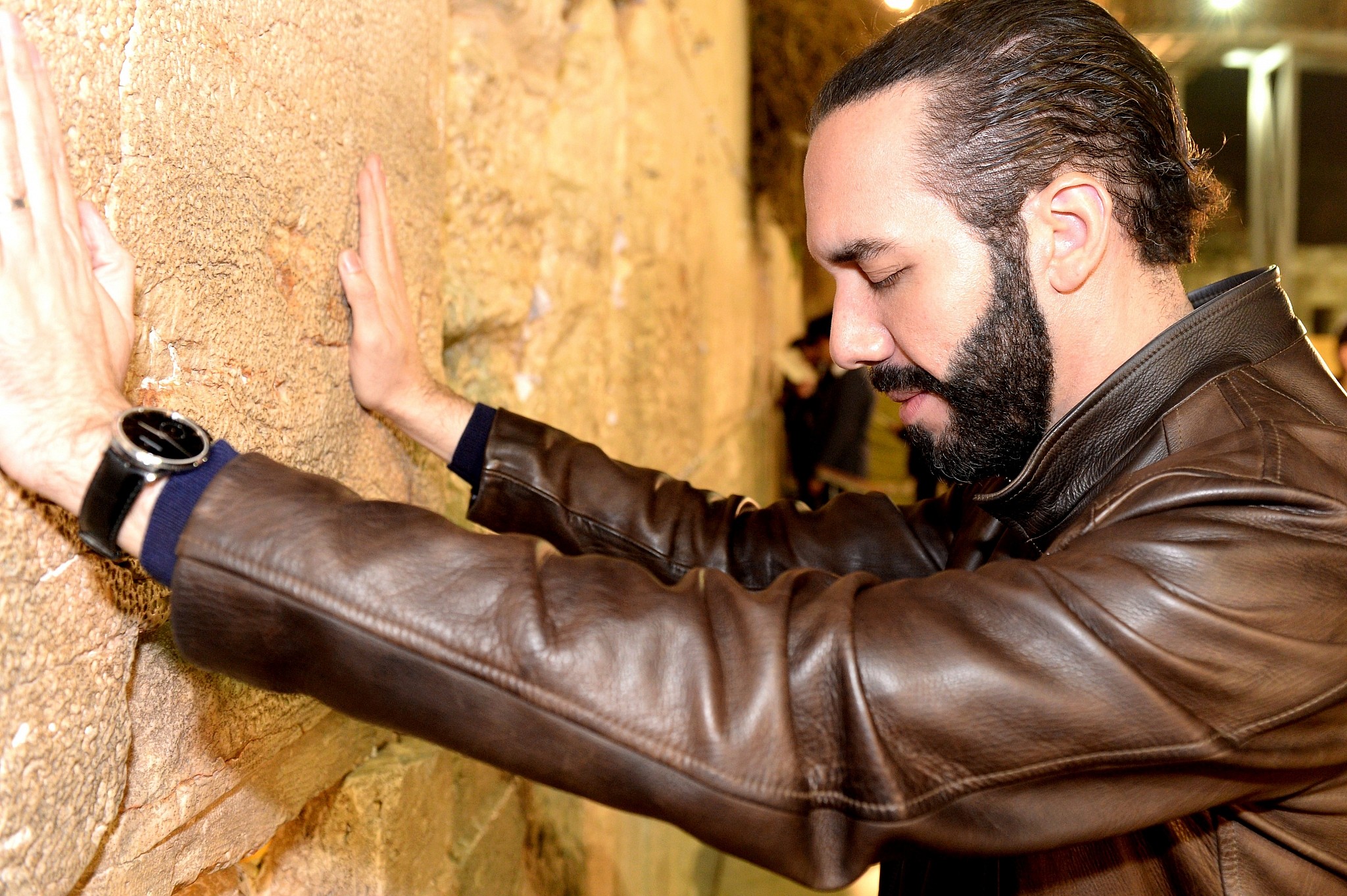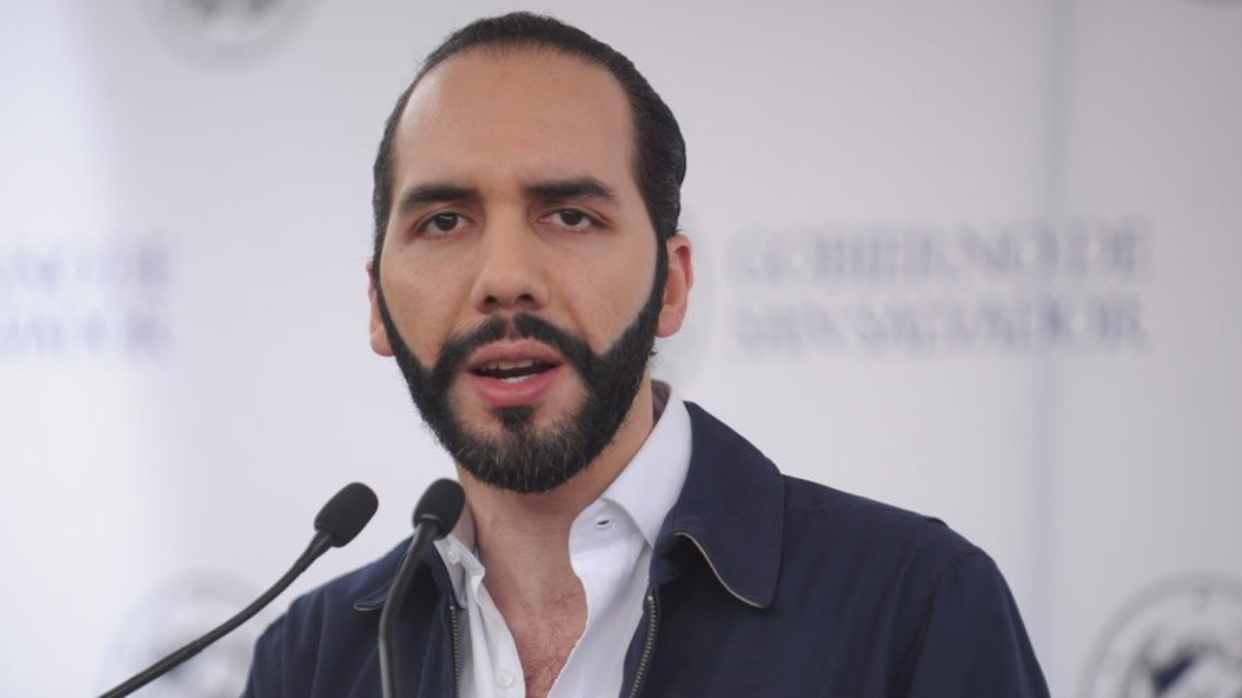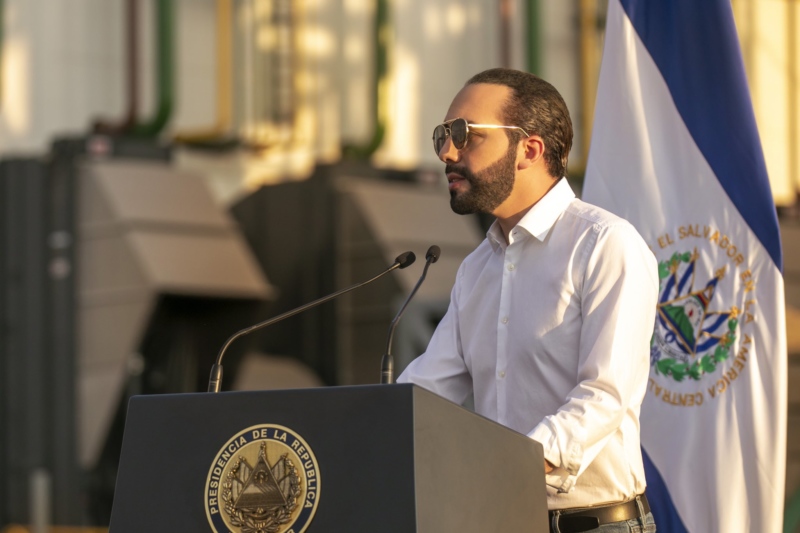Nayib Bukele's religious beliefs
Does faith truly steer the course of a nation's leader? For Nayib Bukele, the answer appears to be a resounding yes, with his Roman Catholic convictions deeply interwoven into his governance of El Salvador. Nayib Bukele, the current President of El Salvador, is a Roman Catholic. He has spoken openly about his faith on several occasions, and he has said that it is an important part of his life. In a 2019 interview with the Catholic News Agency, Bukele said, "My faith is very important to me. It's what gives me strength and guidance in my life."
The interplay between personal faith and political power is a delicate balance, particularly in a diverse and often secular world. However, for Bukele, the tenets of Catholicism appear to provide a moral compass, influencing not only his personal conduct but also the policies he champions as president. This influence is most visible in his unwavering stance on issues like marriage, family, abortion, and euthanasia, where he aligns himself closely with the doctrines of the Catholic Church. As El Salvador navigates complex social and ethical landscapes, Bukele's religious beliefs are poised to remain a significant factor in shaping its future direction.
- Ullu New The Ultimate Guide To Indias Trendiest Ott Platform
- Somaliwasmo A Rising Star In The Music Scene You Need To Know
| Name: | Nayib Bukele |
| Birth date: | July 24, 1981 |
| Birth place: | San Salvador, El Salvador |
| Occupation: | President of El Salvador |
| Political party: | New Ideas |
| Religion: | Roman Catholic |
| Spouse: | Gabriela Rodrguez de Bukele |
| Children: | Layla Bukele Rodrguez, and others |
| Education: | He studied law at the Central American University in San Salvador, but he did not complete his studies. |
| Business Career: | Prior to entering politics, Bukele was involved in his family's advertising business and later founded his own marketing company. |
| Political Career: | -Mayor of Nuevo Cuscatln (2012-2015) -Mayor of San Salvador (2015-2018) -President of El Salvador (2019-present) |
| Reference: | Official Website of the Presidency of El Salvador |
Delving deeper into Nayib Bukele's religion, it is evident that his faith extends beyond mere adherence to religious rituals. It is a lived experience that permeates his worldview and informs his approach to governance. Here are seven pivotal aspects that underscore the significance of his faith in his leadership:
- Roman Catholic Identity: Bukele's affiliation with the Roman Catholic Church, a global institution with over a billion followers, places him within a rich tradition of theological and ethical thought. This connection provides a framework for understanding his moral convictions and their application to public life.
- Faith as a Guiding Force: Bukele has openly acknowledged the role of faith in his life, describing it as a source of strength and guidance. This suggests that his decision-making process is influenced by his spiritual beliefs, prompting him to consider the ethical implications of his actions.
- Policy Implications of Faith: The influence of Bukele's religious beliefs on his policies is undeniable. His vocal support for the Catholic Church's teachings on marriage and family reflects a commitment to upholding traditional values and promoting the nuclear family as the cornerstone of society.
- Unwavering Stance on Abortion: Bukele's firm opposition to abortion, which is currently illegal in El Salvador except in cases where the mother's life is at risk, aligns with the Catholic Church's pro-life stance. This position reflects a belief in the sanctity of life from conception, guiding his policies and public statements on the issue.
- Rejection of Euthanasia: Similar to his stance on abortion, Bukele's opposition to euthanasia is rooted in his religious beliefs about the inherent value of human life. His position is in accordance with Catholic doctrine, which views euthanasia as a violation of the sanctity of life.
- Faith-Driven Social Justice: Bukele's commitment to social justice stems from his religious belief in the inherent dignity of all human beings. He believes that his faith calls him to advocate for the poor and marginalized, working to create a more equitable society where everyone has the opportunity to thrive.
- Emphasis on Family Values: As a married man with three children, Bukele places a strong emphasis on family values. He views the family as the bedrock of society and believes that policies should be designed to support and strengthen families, fostering a nurturing environment for children to flourish.
These seven aspects provide a comprehensive overview of the profound influence of religion on Nayib Bukele's leadership. His unwavering commitment to his faith serves as a guiding principle in his decision-making, shaping his policies and informing his vision for El Salvador.
As a member of the world's largest Christian denomination, Nayib Bukele's Roman Catholic faith forms a bedrock of his moral and ethical framework. His worldview, shaped by the teachings of the Church, influences his decision-making and policies as President of El Salvador.
- Anjali Arora Mms Video Download The Untold Story Behind The Controversy
- Bollyflix Com Hd Your Ultimate Destination For Bollywood Entertainment
The Roman Catholic Church provides its members with a comprehensive set of doctrines and moral principles. These teachings encompass beliefs about God, Jesus Christ, the Holy Spirit, the Bible, and the sacraments, offering a profound understanding of the divine and humanity's relationship with it. The Church also emphasizes the importance of social justice, urging its followers to serve the poor and marginalized, promoting compassion and empathy in their interactions with others.
Echoing the Church's teachings, Bukele has articulated his personal commitment to serving others and working for the common good. This dedication is reflected in his administration's efforts to alleviate poverty, enhance educational opportunities, and combat corruption. These initiatives, aimed at improving the lives of all Salvadorans, demonstrate the tangible impact of his faith on his governance.
Given his unwavering devotion to the Catholic faith, it is reasonable to anticipate that Bukele's religious beliefs will continue to shape his policies and guide his actions as president. His deep-seated faith serves as a compass, directing him toward decisions that align with his moral convictions and promote the well-being of the Salvadoran people.
At the heart of Nayib Bukele's faith lies a profound connection to his inner self and a deep-seated belief in a higher power. This faith serves as a constant source of strength, guiding his actions and shaping his decisions as President of El Salvador.
- Source of Personal Strength: Bukele has openly shared that his faith provides him with resilience and fortitude, enabling him to overcome challenges and persevere in the face of adversity. This inner strength empowers him to lead with conviction and determination.
- Inspiration for Social Justice: Bukele's faith compels him to advocate for social justice and to uplift the marginalized. He believes that his role as president is to create a more equitable society where everyone has the opportunity to flourish, reflecting the Church's call to serve the vulnerable.
- Guardian of Traditional Values: Bukele is a staunch defender of traditional family values, viewing the family as the bedrock of society. He champions policies that support and strengthen families, fostering a nurturing environment for future generations.
- Moral Compass for Political Choices: Bukele's faith serves as a guiding principle in his political decision-making, informing his stance on complex ethical issues. For instance, his opposition to abortion and euthanasia aligns with the moral teachings of the Catholic Church, demonstrating the influence of faith on his political convictions.
In essence, Bukele's faith is more than just a set of religious beliefs; it is a transformative force that permeates every aspect of his life, shaping his character, guiding his actions, and inspiring him to lead El Salvador with compassion, integrity, and a steadfast commitment to his values.
Examining Nayib Bukele's policies through the lens of his religious beliefs reveals a clear and consistent influence. His faith serves as a compass, guiding his decisions and shaping his approach to governance.
- Championing Traditional Family Values: Bukele's unwavering support for traditional family values is evident in his policies that prioritize the family as the cornerstone of society. His administration has implemented initiatives aimed at strengthening families, providing resources and support to help them thrive.
- Investing in Education: Recognizing the transformative power of education, Bukele has significantly increased funding for educational programs and initiatives. His commitment to improving the quality of education reflects his belief that education is essential for personal and social advancement.
- Expanding Access to Healthcare: Guided by his belief that everyone deserves access to quality healthcare, Bukele has spearheaded reforms to make healthcare more affordable and accessible to all Salvadorans. His administration has invested in improving healthcare infrastructure and expanding access to essential medical services.
- Promoting Social Justice and Equality: Bukele's commitment to social justice is reflected in the implementation of numerous social programs designed to uplift the poor and marginalized. These initiatives aim to reduce poverty, promote equality, and create a more just society for all Salvadorans.
In conclusion, Bukele's religious beliefs have profoundly influenced his policies as president. His unwavering faith serves as a guiding force, shaping his decisions and inspiring him to create a more just, equitable, and prosperous society for all Salvadorans.
As a devout Roman Catholic, Nayib Bukele's stance on abortion is deeply rooted in his religious beliefs. His unwavering conviction is that life begins at conception and that abortion is therefore morally wrong.
- Religious Foundation: Bukele's staunch opposition to abortion stems directly from his religious beliefs, which uphold the sanctity of life from the moment of conception. This conviction shapes his moral compass and guides his actions on this sensitive issue.
- Personal Perspective: Bukele has openly shared that his personal experiences have further solidified his stance against abortion. He has witnessed firsthand the emotional and psychological toll that abortion can take, reinforcing his belief in the importance of protecting unborn life.
- Alignment with Public Sentiment: Bukele's position on abortion aligns with the prevailing sentiment in El Salvador, where a significant majority of the population opposes abortion in most or all cases. This alignment reflects his awareness of the cultural and religious values of his constituents.
- Political Considerations: While his religious beliefs are the primary driver of his stance on abortion, Bukele is also mindful of the political implications of this issue. His position reflects an understanding of the diverse perspectives within Salvadoran society and the need to navigate this sensitive topic with careful consideration.
In summary, Bukele's unwavering opposition to abortion is a multifaceted stance rooted in his religious beliefs, informed by personal experiences, aligned with public sentiment, and influenced by political considerations.
The bedrock of Nayib Bukele's opposition to euthanasia lies in his unwavering Roman Catholic faith. The Catholic Church unequivocally condemns euthanasia, viewing it as a grave sin and a violation of the sanctity of human life.
Bukele's personal experiences have further strengthened his stance against euthanasia. He has witnessed the suffering that can accompany end-of-life decisions, reinforcing his belief in the importance of preserving life and providing compassionate care to those who are nearing the end of their journey.
Bukele's position on euthanasia resonates with the views of a significant portion of the Salvadoran population. Public opinion surveys consistently reveal that a majority of Salvadorans believe that euthanasia should be illegal in most or all cases, reflecting the cultural and religious values of the nation.
In essence, Bukele's unwavering opposition to euthanasia is a confluence of his religious convictions, personal experiences, and political considerations. These factors combine to form a strong and consistent stance on this complex ethical issue.
At the heart of Nayib Bukele's commitment to social justice is his profound Roman Catholic faith. Inspired by the teachings of the Church, Bukele believes that all people are created in the image and likeness of God, and that we are therefore called to love and serve one another.
- Upholding the Preferential Option for the Poor: Bukele embraces the Catholic Church's concept of the preferential option for the poor, prioritizing the needs of the marginalized and vulnerable in society. This principle guides his policies and initiatives, ensuring that the most disadvantaged are given special attention.
- Promoting Solidarity with the Vulnerable: Bukele demonstrates solidarity with the poor and marginalized by standing alongside them in their struggles and advocating for a more just and equitable society. His actions reflect a commitment to working alongside those who are most in need.
- Championing Social Justice: Bukele views social justice as an integral component of the Gospel message. He strives to create a society where everyone has the opportunity to live a dignified and fulfilling life, reflecting the Church's call to promote justice and equality.
- Pursuing the Common Good: Bukele is dedicated to working for the common good, seeking to create a society where all people can thrive. He believes that focusing on the needs of the poor and marginalized is the most effective way to achieve the common good, ensuring that everyone benefits from a just and equitable society.
In conclusion, Bukele's unwavering commitment to social justice is a direct result of his Catholic faith. His belief in the inherent dignity of all people inspires him to advocate for the poor and marginalized, striving to create a society where everyone can live a life of purpose and fulfillment.
As a devout Catholic, Nayib Bukele places immense value on family. His strong belief is that family is the cornerstone of society, playing an essential role in the healthy development of children.
- Honoring the Sacrament of Marriage: Bukele upholds the Catholic Church's teaching that marriage is a sacred union between one man and one woman. He views marriage as a lifelong commitment, a bond that provides stability and support for families.
- Cherishing Children as Gifts from God: Bukele embraces the Church's view that children are a precious gift from God. He expresses gratitude for his own children and recognizes their importance in shaping the future of society.
- Cultivating a Loving and Respectful Family Life: Bukele strives to embody the principles of love, respect, and forgiveness in his family life, aligning with the Church's teachings on creating a nurturing and harmonious home environment.
- Advocating for Social Justice: Bukele's commitment to social justice extends to his views on family. He recognizes the importance of supporting families in need and creating a society where all children have the opportunity to thrive.
In summary, Bukele's Catholic faith profoundly influences his views on family. He believes in protecting and strengthening families, recognizing their vital role in building a just and prosperous society.
To better understand the complexities surrounding Nayib Bukele's religious beliefs, let's address some frequently asked questions and dispel any misconceptions.
Question 1: What is Nayib Bukele's religion?
Nayib Bukele identifies as a Roman Catholic. He has openly discussed his faith and its significance in both his personal life and his decision-making processes.
Question 2: In what ways does Bukele's religion influence his policies?
Bukele's religious convictions have shaped several aspects of his policy agenda, notably his firm stance against abortion and euthanasia, his advocacy for traditional family values, and his dedication to promoting social justice and assisting the poor and marginalized.
Question 3: What are Bukele's perspectives on marriage and family?
Bukele's Catholic faith places a high premium on the institutions of marriage and family. He adheres to the belief that marriage is a sacred bond between a man and a woman and that strong families serve as the bedrock of a thriving society.
Question 4: How does Bukele's religion impact his personal life?
Faith plays a central role in Bukele's personal life. He has stated that it provides him with strength and direction, and that he strives to conduct his life in accordance with Catholic principles.
Question 5: What criticisms have been leveled against Bukele regarding the influence of his religion on his presidency?
Some critics contend that Bukele's religious convictions have led him to make decisions that encroach upon the separation of church and state, citing his opposition to same-sex marriage as a prime example.
Question 6: What is the overall effect of Bukele's religion on El Salvador?
Bukele's religious beliefs have had a noteworthy impact on El Salvador. His policies reflect his Catholic values, and his personal faith has served as an inspiration to many Salvadorans.
In summation, Nayib Bukele's religious beliefs are an indispensable aspect of his character and leadership. His faith has played a pivotal role in shaping his policies, his personal conduct, and the overall trajectory of El Salvador.
To truly grasp the essence of Nayib Bukele's religious beliefs, it's essential to delve into specific strategies for understanding and appreciating their significance.
Recognizing the core tenets of Catholicism is paramount. Since Bukele is a devoted Roman Catholic, comprehending the teachings and values of Catholicism is fundamental to grasping his religious convictions.
Carefully examining Bukele's public pronouncements is crucial. He has openly shared his faith on various occasions, offering insights into his religious views through interviews, speeches, and social media.
Analyzing his policy decisions provides valuable clues. Bukele's religious beliefs have a discernible impact on his policies, offering a window into his faith-based values through the initiatives he has championed and implemented.
Considering the Salvadoran context is essential. El Salvador is a predominantly Catholic nation, and Bukele's religious beliefs reflect the cultural and social milieu in which he operates.
Approaching discussions with respect for diverse perspectives is vital. Recognizing that individuals may hold differing interpretations of Bukele's faith fosters a more nuanced and inclusive understanding.
By embracing these strategies, we can gain a deeper appreciation of Nayib Bukele's religious beliefs and their profound influence on his life, leadership, and the nation of El Salvador.
- Hdhub4ure Your Ultimate Guide To Streaming And Downloading Movies Online
- Mia Threapleton The Rising Star In The Spotlight


